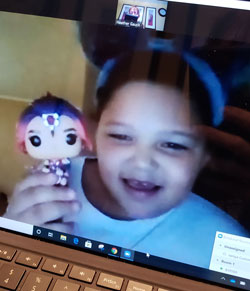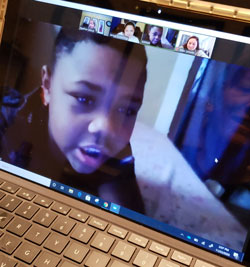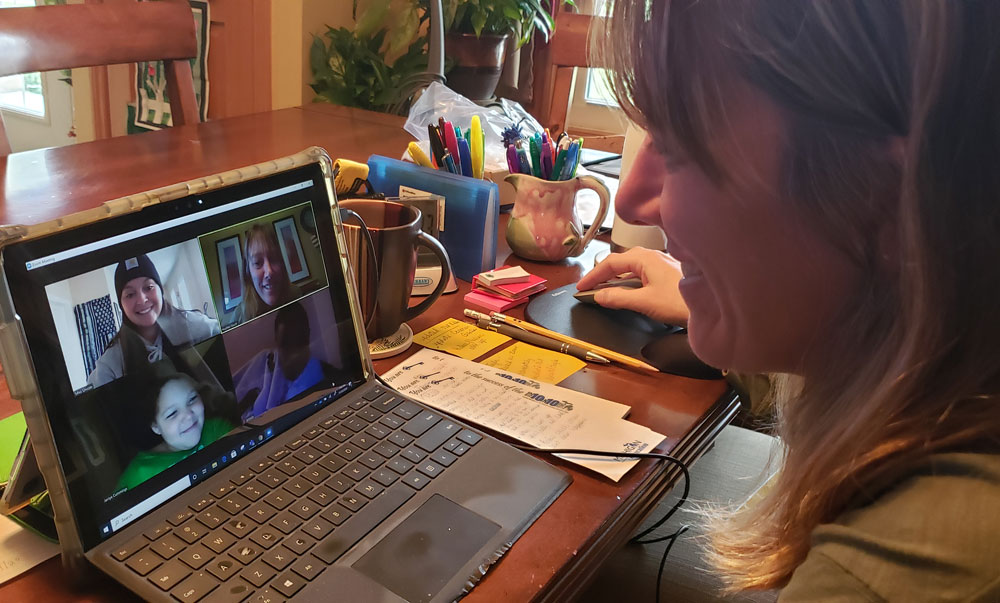Grand Rapids — Ja’Niya Cummings sees three gingerbread men on her computer screen, each wearing a letter: n, a, v. “First sound,” says her teacher, Heather Gauck.
“V,” says the second-grader, drawing out the vvvv sound, and Gauck drags the gingerbread letter into a picture frame. “Eh-eh-a, the gingerbread,” Ja’Niya says, then “n,” as Gauck also drags those letters into the frame to spell “van.”
“I love it, Ja’Niya,” Gauck says. “You are getting so good at this. And I also like how you used some of your visual phonics for that.”
Then it’s on to spelling “bag” in this one-on-one learning session for the Harrison Park School pupil. It was a lesson on consonant-vowel-consonant words, part of Ja’Niya’s Individual Education Plan (IEP) as a special-education student. But instead of working with Ja’Niya in a classroom, Gauck was teaching on Zoom, both from their homes.
It’s a teaching modality Gauck and hundreds of other GRPS teachers used in the district’s all-virtual format during the first semester. And it’s a method Gauck will continue to use even as other teachers switch to a hybrid plan of in-person and virtual instruction beginning Jan. 19.
For Gauck, who has extensive background in online teaching tools, the forced conversion to all-virtual teaching this fall was easier than for less digitally dexterous teachers. But even for her this year of teaching remotely has been a big challenge, compounded by working with students with special needs.
“I feel a lot of sympathy for all these teachers who did not use technology,” said Gauck, a resource teacher for students with impairments and learning disabilities.
And yet it’s been rewarding to see how teachers and families have come together to make virtual learning work the best it can, she said.
“I can’t say how many phone calls, how many teachers are in tears because it’s almost 24/7. But we’re all doing it. We’re finding a way to do it and just relying on each other.”

A Heavy Learning Lift
Learning the ropes of online learning has been a heavy lift for teachers, students and parents in all districts in a year of COVID-19 outbreaks and state-ordered restrictions. Especially so in GRPS, which has taught 100% virtual since school opened but is giving students the option of hybrid or virtual learning for second semester.
At last count, 9,253 students had chosen hybrid and 5,394 virtual, with pools of teachers designated to teach in classrooms, virtually or both, said spokesman John Helmholdt. Thousands of devices have been distributed to students along with hotspots for those lacking Wi-Fi access.
Gauck has plenty of experience in both methods and has helped train other teachers in online instruction. In her 27th year at GRPS, she has been on the forefront of educational technology including as organizer of a statewide cadre of teachers called Innovation Classroom. A National Board-certified teacher, she will teach a special-education master’s degree class in instructional technology at Grand Valley State University this spring.
At Harrison Park, she works with several grades of special-education students in their gen-ed classrooms and pulls them out for more intensive work. This year she’s had to do that online, which for all its logistical hurdles has been advantageous in some ways, she said.
“It is a lot to keep track of, but in a way it has helped me know what each teacher is teaching, unlike when I was in the physical classroom,” she said. “With everything online, it has made things available whenever I have the time to look at it.”
That’s helped her make sure she’s tying in each student’s learning-plan goals with what they’re learning in class, she said. By recording Zoom sessions she can go back and analyze where they need help on math or reading skills and tailor activities accordingly.
It all requires constant creativity, she said, but added, “One thing that has been confirmed during this pandemic is that if educators are given a challenge, we find a way to solve it for the success of our students.”

Connecting Emotionally Through Screens
Still, she concedes it’s hard to measure progress with traditional tests online, not knowing whether the student may be receiving help at home. Most challenging is keeping students engaged and working through the glitches of weak internet connections, she said.
“The biggest challenge is the technology not working,” as when the sound cuts out, Gauck said. “You can have a wonderful lesson and then the technical glitches make it go out the window.”
Distractions like background noise and younger siblings running around is another issue, she said. “We try to say, ‘It is school time, try to find a spot where it’s quiet and you can really concentrate, and you have your paper and your pencil.’”
Focusing their attention is key for students like Ja’Niya, whom Gauck worked with individually in the fall along with her brother, Josiah. In a 20-minute Zoom session one December afternoon, despite spotty audio and occasional screen freezes, Ja’Niya worked through a series of vowel-and-consonant combinations, sounding them out and forming words.
“Teacher, I know how to spell hat,” she said, then proceeded to do so while sounding out each letter.
There was also chit-chat. Ja’Niya: “Guess what tomorrow is?” Gauck, playfully: “Is it your birth-day?” “Yes,” Ja’Niya said proudly, and Gauck laughed.
Afterward, Gauck was very happy with the progress Ja’Niya had shown academically. But it’s things like the birthday chatter that she finds most rewarding.
“It’s those more human type exchanges that I have with my students that make it all worthwhile. I am so glad I am still able to connect with my students. That’s what’s most important right now — to know that they’re OK, and they’re still wanting to learn.”











